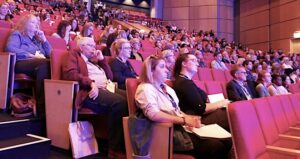UK AUDIOLOGY PROFESSION SURVEY: DEEPER REACH, RICHER INSIGHTS: REFORM ESSENTIAL
Building on the success of last year’s groundbreaking private-sector focus, the British Irish Hearing Instrument Manufacturers Association (BIHIMA) has released the findings of its most expansive annual survey to date. With participation from a more diverse cross-section of the audiology profession – especially a rise in NHS respondents – the 2024/5 survey sheds light on the state of hearing health in the UK, the ongoing pressures facing professionals, and the growing urgency of issues like ear wax removal, dementia, and access to care.
A more inclusive picture of UK audiology

BIHIMA claims participation in its 2024/5 survey reflects “a more diverse cross-section of the audiology profession – especially a rise in NHS respondents”
© Audiology News UK
The 2025 survey marks a turning point in BIHIMA’s data-gathering efforts, with significantly higher NHS participation numbers and a broader scope of questions. Respondents were drawn from across both public and private sectors – with 55% private respondents, 33% NHS and 12% working in a combination of the two – providing a more inclusive picture of current realities.
“We wanted to dig deeper this year, especially into areas like dementia, hearing loss stigma, and the impact of tinnitus on audiologist’s workload,” said Paul Surridge, Chairman of BIHIMA. “The feedback we received reflects a profession that is passionate, stretched, and calling for systemic support.”
Challenges in the profession: workload, staffing, and legislation
One of the most persistent themes throughout the survey is the ongoing pressure on audiologists due to NHS waiting times, the lack of self-referral options, unequal provisions, and staff shortages.
Significantly, 70% of audiologists reported that NHS waiting times were impacting provisions for people with hearing devices, while 80% felt that changes needed to be made in order to improve access to primary care audiology services. Potential changes included removing the need for GP referrals, voucher schemes, more audiologists (and higher salaries) and more community clinics.
One audiologist said: “The centralisation of services has resulted in fewer clinics in the community and an increase in waiting times for both adult and paediatric population. I also believe that a voucher system or government subsidy towards the cost of devices similar to the New Zealand and Australian system will allow more patients to access hearing devices privately and reduce the strain on the NHS to provide devices and then in turn focus on more specialised services.”
Another said: “Self-referral should be implemented nationally, so GPs are not gate keeping services. NHS community provider options commissioned nationally to provide consistent national access to audiology services. [I would like to see more] national campaigns to raise awareness of the benefits of aiding hearing loss for the medical profession and for potential service users.”
A large proportion of respondents said that all healthcare providers, manufacturers and government organisations had a role to play in tackling the stigma – and improving uptake – of hearing instruments. They also felt that improved access to training pathways (especially with regards to tinnitus care) and more collaboration between NHS and private providers would vastly improve the situation.
The unresolved issue of earwax removal
Perhaps no single topic drew more exasperated commentary than the enduring challenge of earwax removal. Despite the formation of a national task force in 2022, little progress appears to have been made, and the absence of a unified policy continues to leave both patients and professionals in limbo.
The majority of respondents agreed that earwax removals should once again be made free in primary care and that it was integral that the service becomes regulated.
“All wax removal services should only be carried out by trained professionals and not by people going on one day courses,” said one practitioner, “Further training for people like audiologists and nurses is needed and only those who are qualified should carry out wax removal. Perhaps a certificate of competency and only professionals with this should carry out the service.”
The Royal National Institute for Deaf People (RNID) has recently ramped up its advocacy efforts, urging patients to contact their MPs and demand national action – a clear sign that frustration is boiling over. However, audiologists fear that the risk of damage to people’s ears is already too high.
One audiologist said: “[Hearing care services must] involve the independent sector in primary care. Allowing self-referral will free up GP and NHS appointments. [Ear wax removals should] only be carried out by qualified and experienced professionals in the hearing industry – not from other industries who only have a two-day course and start a service. They would not know how to spot contra indications and serious problems in the ear.”
Hearing loss and dementia
The expanded questions in this year’s survey offered new insight into the connection between hearing health and dementia, an area gaining momentum thanks to mounting media attention but one that also finds itself in the centre of controversy.
According to the survey, many audiologists feel that the conversations around dementia and hearing loss need to be handled carefully and without scaremongering. Several respondents pointed out research is still developing, and they believe that the link is one of association rather than causation.
“[We need to manage this narrative] in a fact-based way, that is responsible and not using self-selected evidence to scare people into buying hearing aids. Painting the benefits of treating and maintaining good hearing is essential,” noted one audiologist.
Another claimed: “[We need to] stop the common claim that hearing aids prevent dementia. It is a lie that the private sector and politicians are using to discredit the NHS service. It can prevent dementia in the way it provides the ability to communicate so cognitive decline may be slowed but it’s not as cut and dry as people are making it out to be.”
Stigma remains a barrier to early care
Despite technological advances and better public messaging, stigma surrounding hearing loss remains a powerful deterrent to early intervention. An enormous 95% of audiologists felt that stigma was still a factor in people not getting their hearing tested and/or wearing their hearing devices (32% said it was ‘still a significant factor’ and 63% said it was ‘still a factor but declining in importance).
They felt that ways to tackle this stigma included more coverage of celebrities wearing hearing instruments, a move away from calling them ‘hearing aids’, continued education of the importance of normalising hearing health.
Industry must stop promoting hearing aids as invisible
A comment that came up several times centred around the use of the phrase invisible hearing aids.
“We need to normalise hearing aid use and move away from the advertising rhetoric about making hearing aids invisible as this only serves to reinforce the stigma and feeling that hearing loss should be hidden.”
“We must stop private companies advertising invisible hearing aids which encourage the stigma and people to be embarrassed and hide their loss.”
“The industry must stop promoting invisible and discreet hearing instruments as this reinforces the stigma that hearing loss and hearing instruments are an embarrassment.”
BIHIMA has long championed public education efforts, and this year’s findings reinforce the importance of sustained awareness campaigns to challenge outdated views.
The biggest concerns for patients

Some audiologists say they have seen an increase in tinnitus cases in people under 50-years-old, though half of the professionals surveyed believe the number of tinnitus cases is unchanged.
Getty Images/iStockphoto – SinArtCreative
This year, the survey specifically asked audiologists whether they had seen more cases of tinnitus. Views were mixed, with around half feeling tinnitus cases remained the same, and half feeling there had been a considerable increase. Some said it was now the majority of their workload – and that they had seen an increase in cases under 50 due to the use of headphones and ear buds – and that many patients now mention tinnitus as an issue alongside their other hearing loss concerns.
There was a strong consensus when discussing the biggest problems patients came to audiologists with. The two most common issues were hearing with background noise and ear wax. They also mentioned affordability of hearing care, adjusting hearing instruments that had been poorly fitted elsewhere and connectivity issues.
Forward momentum: what next?

A BIHIMA survey answered this year by an increased proportion of NHS audiologists revealed calls for greater cross-sector collaboration to help solve issues that include earwax, waiting lists, and the workforce crisis.
Getty Images – No-Mad
The 2024/5 BIHIMA audiologist survey paints a sobering yet vital portrait of a profession at a critical juncture. With pressures mounting across both the public and private sectors – from overwhelming NHS waiting lists to unresolved issues like ear wax removal, staffing shortages, rising tinnitus cases, and the ongoing stigma of hearing loss – the message from audiologists is clear: reform is not optional, it is essential.
There is a widespread call for national self-referral pathways, the return of regulated, free ear wax removal services in primary care, and improved access to training and collaborative working across sectors. The need to reframe the conversation around dementia and hearing loss – grounded in evidence, not fear – is another priority, as is the urgent dismantling of stigma through responsible messaging and public education.
Ultimately, these changes cannot rest on the shoulders of audiologists alone. They require commitment and accountability from policymakers, service commissioners, educators, manufacturers, and advocacy groups.
As Paul Surridge, Chairman of BIHIMA, summarised:
“This year’s survey has highlighted the growing burden our audiology professionals carry and the disconnect between what they’re able to provide and what patients truly need. As a sector, we must act decisively: to expand access, to standardise service quality, and to elevate the profession through education, investment, and public awareness. We’re not just talking about hearing care – we’re talking about quality of life, and we all have a stake in that.”
The findings set a clear direction for the future. Now, it’s time to listen – and act.
 Sign in
Sign in